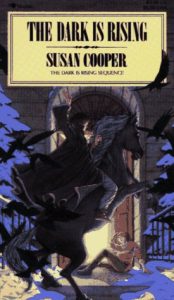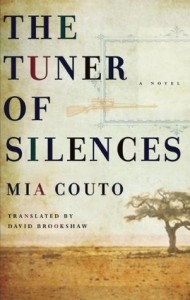 When I saw on Twitter that Robert Macfarlane had proposed a book group where we all start reading The Dark is Rising by Susan Cooper on Midwinter’s Eve (the day the book starts) and share our experiences under the hashtag #TheDarkisReading, I was in heaven. He’d brought together my so many of my favorite things in one simple idea: my favorite social platform, sharing thoughts about books, and a beloved childhood classic. What a wonderful trip the past few days have been.
When I saw on Twitter that Robert Macfarlane had proposed a book group where we all start reading The Dark is Rising by Susan Cooper on Midwinter’s Eve (the day the book starts) and share our experiences under the hashtag #TheDarkisReading, I was in heaven. He’d brought together my so many of my favorite things in one simple idea: my favorite social platform, sharing thoughts about books, and a beloved childhood classic. What a wonderful trip the past few days have been.
The First Time I Read The Dark is Rising
I can’t remember if I was nine or ten when I read Greenwitch, the third book in this series, for school, but I was instantly hooked and read the whole series. Though I’ve always been a reader, this was my first “gotta read ’em all” experience. I don’t remember a lot else from that first exposure, except a swelling pride in my Welsh heritage and maybe (just once I swear) asking my mom if we were descended from Welsh magicians. And when I saw the word “rook” in this text, I remembered these books were my introduction to that word (and others) and what that quest to understand first felt like.
The Dark is Rising in the Past 30 Years
I may have re-read the series once since I was a child, but my main relationship to the books since then has been forcing them on anyone I cared about who I thought would enjoy the books themselves and maybe also sharing in this magical other world that I carried in my heart. My victims included my brother (who lost my copies but eventually bought me the new ones I’m reading today), my now husband (who probably never actually read the books but humored me with Salinger so he’s forgiven), and my stepbrother (who found the books too scary at his tender age and was the reason I stopped forcing them on people). I’ve been saving my (new, thanks Tosh!) copies in my son’s closet for the day I thought he might be ready for them, but at the age of two he thinks Gruffalo is scary, so we have a ways to go.
What Re-reading The Dark is Rising Felt Like
The Old is New Again
In opening The Dark is Rising for the first time in decades this past week, I realized how little I remembered and how much this book now reminded me of other books. From echoes of Woolf’s To the Lighthouse on the first page to more expected similarities between Tolkien’s Lord of the Rings and Grossman’s The Magicians and L’Engle’s A Wrinkle in Time. Some of these convergences are unavoidable coincidences of trope and some are loving tributes (in all directions because some of those books predate The Dark is Rising, one is a contemporary of the book and one is modern to now). Regardless, The Dark is Rising manages to feel fresh and compelling throughout. Even to someone who’s read it before.
Coming of Age, Coming to Light
“As he stared at the fierce, secret lines of that face, the world he had inhabited since he was born seemed to whirl and break and come down again in a pattern that was not the same as before.” – Susan Cooper, The Dark is Rising
Perhaps one of the most important things The Dark is Rising made me appreciate was the way books written for children use the specialness of one child to inspire generations of children on their own individual quests for greatness. This should have occurred to me with Harry Potter (which I still haven’t read) or any number of other books, but the craft in The Dark is Rising is such that I could see how other children could aspire to be like Will, an otherwise ordinary boy among a passel of siblings, who happens to be born on Midwinter’s Day as the seventh son of a seventh son. It isn’t until his eleventh birthday that he starts to realize he is special, the last of the Old Ones to be born, and even that realization takes much coaching from a mysterious old fellow called Merriman Lyon (a name that made my heart leap with glee and reminded me instantly of his true name—but that’s a story for another book).
“He was crystal-clear awake, in a Midwinter Day that had been waiting for him to wake into it since the day he had been born, and, he somehow knew, for centuries before that.” – Susan Cooper, The Dark is Rising
This type of story reaches into the heart of every child at an age where they’re growing from the light of their mothers’ eyes to being parts of a much larger world. It’s a tricky age and a difficult transition and, while a standard formulation for a coming of age novel, Cooper does a better job than most of creating that atmosphere where each of us is special enough to become something more than we are today. She shows us some of the struggles and the work, specialness isn’t simply handed out, and that we each have a role to play. Whether we’re descended from Welsh magicians or not.
The Craft of Unfolding
The biggest literary lesson I’m taking away from The Dark is Rising is how Cooper uses Merriman Lyon to teach the reader about the world Will is newly entering. On the surface, Merriman is teaching Will with lines like “Expect nothing and fear nothing, here or anywhere” because the Dark cannot kill an Old One, but these words also tell the reader what to expect. From direct instructions on what will come next to advice on how to cope, Merriman imparts these lessons throughout the book which keeps Will from bumbling through a disorganized quest and also helps us understand the rules of the book we are reading. This is not a tactic I’d actually recommend to most writers because it’s far too easy to end up telling the reader things you want them to experience instead, but Cooper’s allusions are just delicate enough and the rest of the text enthralling enough that it’s the perfect choice here.
About the Magic
I start to crave magical stories at this time of year. Maybe it’s because I’m not religious but would like to be. Maybe because my dad read Lord of the Rings to my brother and me at a very early age. Or maybe it’s because it’s easy to get a little cooped up in a Seattle winter. But I had just finished binge-watching the latest season of The Magicians on Netflix when it was time to read The Dark is Rising and I didn’t see the connection until I read this piece in The Guardian and understood that this is a season when many of us seek wonder. Because virgin births and a man who can fit through every chimney don’t quite do it for me (though my son thinks Santa is the shit), I’m glad for a great series of books that can connect me to a more ancient form of wonder.
I sometimes wish I could write books like these—full of wonder and eschewing the boundaries of our world. I can’t, yet, but I can run back and start this series over again with Over Sea, Under Stone. Maybe we can re-read it together.
Buy The Dark is Rising for a young person, buy it for yourself. If you buy it from Bookshop.org using that link, your purchase keeps indie booksellers in business and I receive a commission.
 I wrote recently about a
I wrote recently about a